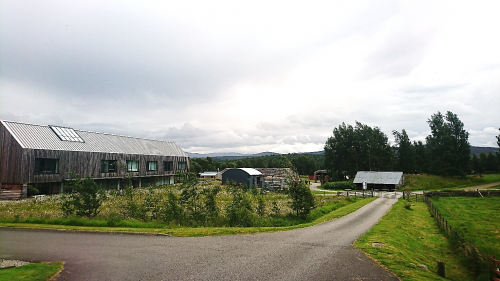Through a series of Rural Business Surveys, our research is developing a better understanding of the characteristics, contributions and aspirations of rural businesses across the South and North-East of Scotland.
In 2018 the Scottish Government estimated that 70,0000 businesses in rural areas and small towns generated over £54 billion in turnover and employed about 450,000 people. However, despite their importance to Scotland’s economy we know little about the role of non-land–based businesses within local economies, or the specific issues they face.
Our research is addressing some of the key knowledge gaps by providing new evidence to support the Scottish Government’s commitments to support the rural economy, as expressed by the National Council of Rural Advisers.

Stage
Directory of Expertise
Purpose
Through three annual Rural Business Surveys (2018-2020) we aim to provide evidence to help fill the knowledge gaps on the wider rural business base beyond the farming, forestry and rural estate sector.
Our surveys are focused on businesses in Aberdeenshire, Dumfries & Galloway, the Scottish Borders and Tayside – areas predicted to have been most adversely affected in the 2015 Common Agricultural Policy reforms. As the land-based sector is already well researched, those businesses whose primary focus was agriculture, estate or forestry were excluded from the survey. However, all of the ancillary businesses that make up the wider agriculture, estate and forestry supply chains, such as feed merchants, fencing contractors, machinery dealers, sawmills, food processors, etc. were included in the survey.
Funded by both Scottish Enterprise and the Scottish Government, our research is building a profile of the characteristics of rural businesses, the people who run them, their aspirations, motives and perceptions, as well as establishing how connected the wider rural business base is with the land-based sector (farming, forestry and estates).
Ultimately our findings will allow us to develop a better profile of:
- how the rural economy is performing;
- the specific challenges faced by rural businesses;
- the specific support and training needs of rural businesses, and;
- how modifications to agricultural, forestry and estate support may filter through to the wider rural economy, particularly during periods of change.
Results
In 2017/18 we surveyed 1,500 businesses, whilst in 2018/19 we surveyed 1,200 businesses. The key findings from each year can be found here. Our key findings from the 2018/19 survey include:
- The age profile of owners, directors and partners of rural businesses was very similar to that of agriculture – with more than 70% being older than 50 years of age, and over a third being older than 60 years of age.
- There was a large diversity in scale of business. Whilst nearly 30% of businesses generated annual turnovers of more than £500,000, we found that 20% of surveyed businesses were generating less than £50,000 annual turnover (with 10% generating less than £25,000).
- We found that 44% of rural businesses were home based, compared to only 22% in urban areas. Furthermore, 34% of rural businesses had family members working full-time in the business compared to only 24% in small towns.
- Two-thirds of the businesses (65%) reported that they had some form of trading links to the land-based sector, although for many, this relationship only accounted for a small proportion of their overall turnover. However, 15% of all the businesses surveyed reported that business links with agriculture accounted for more than half their turnover. Better understanding of these links is important as it helps shed light on how interconnected different sectors of the rural economy are.
Business links to the land-based sector (2018/19)
- Nearly half of businesses reported that their confidence in Scotland’s economic outlook had stayed much the same between 2017 and 2018, although 42% said it had worsened and only 8% stated that it had improved. Businesses in remote locations, towns and the Scottish Borders were most likely report that their confidence had worsened.
- Poor digital infrastructure/connectivity was considered the biggest constraint to businesses, with 21% saying this was a major concern and 24% reporting it as a minor concern. Other important constraints included challenges recruiting appropriate staff and cash flow.
Business constraints of minor and major concern to businesses
- Only 29% of the business had a 1-year business plan, while only 20% had a 5-year plan. Larger, start-up, and export businesses were most likely to have business plans.
- 71% of respondents indicated that they made purchases from local businesses, whilst 87% reported making sales locally. 51% had suppliers in the rest of the UK compared to only 33% selling to this geography. Similar proportions of respondents were selling to or buying from the EU. 16% of businesses not currently exporting outside of the UK felt that they had goods or services suitable for doing so.
Supplier and purchaser market locations businesses operate in (2018/19)
- Most businesses were neutral or unsure as to how Brexit might affect their businesses. About 30% felt that Brexit would be negative for their business whilst 12% thought it would be positive.
Benefits
The findings from our ongoing research make a significant contribution to improving our understanding of Scotland’s rural business base, at a time when rural economies are receiving considerable policy attention (for example through the recent work of the National Council of Rural Advisers).
There is an extremely wide variety of business scales and types operating in Scotland’s rural areas and small towns, and we have found common challenges being reported by many, particularly regarding workforce recruitment, digital connectivity and cashflow. For some businesses, Brexit related uncertainty has become a particular challenge and unfavorable exchange rates are negatively impacting on those sourcing supplies from abroad.
This research is providing insights into the nature of rural businesses, their structure, confidence and challenges, alongside improving our understanding about connections with the land-based sector. Our research can support the Scottish Government and its Enterprise Agencies, to develop appropriate policies and support measures to help rural entrepreneurs realise their potential and maximise their contribution to Scotland’s economy.